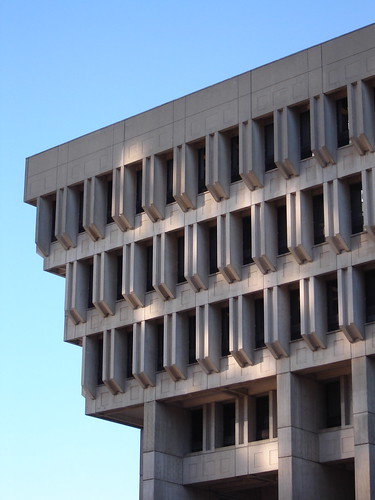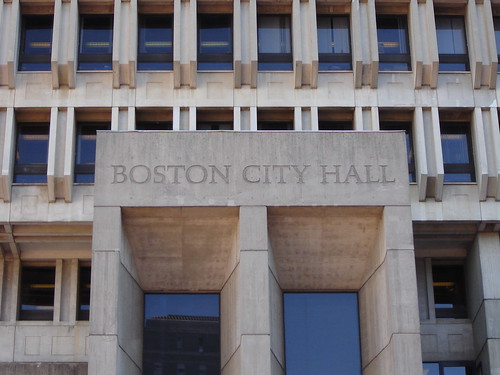Physical Politics
Before I get into the meat of what I actually wanted to post about, I have a couple of quick things that are off topic. First, J actually has gotten around to posting a couple of times about Thailand, so you should all really go and read those. Second, In the last few days, I've read Haruki Murakami's Norwegian Wood twice, and I pretty sure it's on it's way to being my favorite book (I need to wait a couple of weeks to see how it weathers to say for sure), so everyone should really read it. Now on to what I really wanted to post about:
I've been withholding my judgement on what I think about Menino's new plan to move the City Hall to the Fort Point waterfront. Mostly, I've been waiting to see if it's just Menino saying something so it looks like he has opinions or if it's something that could actually happen. Well, a few months have passed now and it seems that people haven't forgotten about it, so I figured it's finally time for my grand opinion to come out. So here's what I think... I'm in favor of it, but only if the old building is preserved. I know what you're thinking. Most everyone who has come out in favor of moving the City Hall have done so emphatically and loudly because the city would knock down the old building, and as a student of planning in Boston I obviously have heard (and participated in) numerous bashing sessions against the Government Plaza (which has actually been named one of the worst public spaces in the world, not just the US, the world). I am not, however, one of those people who is unable to resolve the apparent contradiction between hating Modernist planning and loving Modernist architecture. They simply aren't the same thing to me.
So let me try to explain my position. First though, I have to get into some of my general beliefs about cities and architecture. I believe pretty strongly the ideology and social beliefs shape the physical environment. And that goes beyond the obvious cases like Washington, DC being a symbolic tie to classical democracy, for example. Rather, I think pretty much everything is shaped by those forces. What I really mean by this is that I think that, instead of writing the history of the city from the perspective of the forces that shaped it, I think you can "read" the physical fabric of the city and figure out the forces that constructed them.
Let me give some brief examples from Boston. If you look at the earliest colonial maps of the city, most people note how random the layout appears. Especially when you compare it to other contemporary cities, like Utopian Philadelphia or Charleston, SC, you are really struck by how strange Boston is. This probably reflects a high value on individualism in the colony (or maybe not individualism, but rather a general distrust of government). If you look a little further, you'll also notice that the city was lacking in a defined hierarchy of spaces. There are various small squares spread throughout the city, not one central one. Important buildings (churches, government ect) are scattered throughout the city. This is what I call a centrifugal city. If you look culturally at Boston now, you'll still see the social leftovers of this beginning. For example, New Englanders still really, really distrust government. Look at Christy Mihos' (from the perspective of an outsider) completely insane campaign for governor last year. The man's main point was that he was just going to do whatever the hell he wanted but at least he wasn't with a party and people still voted for him. I really don't think there is anywhere by New England where a campaign like that would get a second thought.
Another good example is the creation of the Back Bay in the early to mid nineteenth century. By that time, the randomness of Boston's streets had stopped symbolising individual opportunity and instead were understood as symbolic of the disorder of immigration and Catholicism. What the Anglo-Protestants created for themselves in the Back Bay, by comparison, is the epitome of logic, order and cleanliness. When you look at a map of Boston, you can tell by the fact that that is the only part of the city which is on a grid that there is something different about that neighborhood, both socially and spatially (especially since the Mass Pike cut through and started serving as a "city wall" to protect the Back Bay from the neighborhoods to the south: the South End and Roxbury). 
So back to my point: why do I think moving the City Hall is a good idea and why do I think the old one should be preserved? I think the City Hall is also, symbolically, important to Boston's history. It represents the period of authoritarian Boston, when the West End disappeared and the city fell apart over busing and in the worst period of public housing. The building itself, with its brutallist facade raising fortress like over the windswept no-man's land of Government Plaza is a fitting memorial to all of the people who lost their homes or lived in poverty during this period. To remove it would be to give up or gloss over this period of Boston's history, and I think that's wrong. I think we need the building there to remind us what urban governance in the second half of the twentieth century was like. We need to remember Boston's dark age. My personal hope would be something like a Museum of the West End (how cool could that be, with so many residents still living who could contribute), Museum of Boston History, Museum of "Urban Renewal" or something like that. The square itself could still be redeveloped, but with building still intact.
But that doesn't mean that we need to keep the functions of our government there. To me, the movement to the waterfront makes perfect sense in our new post-industrial city. It symbolizes the democratization of space that has come with deindustrialization, namely, the fact that we've now regained the waterfront from its former industrial uses for uses of public space and recreation. Now, there are still a lot of questions that need to be addressed to make sure that the City Hall actually would be public space. For example, transit would need to improve to make sure that everyone can get there. But that's maybe for another post. For me, the idea of a waterfront City Hall perfectly fits into Boston's vision for the future, one that, hopefully, will be a whole lot more participatory then the past.




0 comments:
Post a Comment